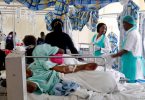To reduce the vulnerability of Persons With Disabilities (PWDs) in Nigeria to sexual abuse, particularly among women and girls, stakeholders in the disability sector, have called on policy makers to come up with all inclusive sexual and reproductive health policy that would enable PWDs have access to basic healthcare services unhindered.
Currently, the uptake of sexual reproductive health services among PWDs in the country is low owing to lack of appropriate laws to ensure their full social integration into society particularly through provision for their economic, health, social, educational, emotional and psychological needs.
Research has shown that the marginalization and exclusion of PWDs in Nigeria from basic services such as health is a consequence of three broad factors: low awareness, poor capacity and inadequacy or absence of appropriate legal and policy frameworks.
Charting the way forward, stakeholder at a Roundtable discourse in Lagos recently, urged the government to put the right structures in place that will effectively promote increased uptake of sexual reproductive health services among PWDs.
The roundtable discussion Tagged: “Voices for Change: Promoting increased uptake of sexual reproductive health services among PWDs in Lagos State”, event was organised by Journalists Against AIDS (JAAIDS) in collaboration with the Nigerian Association of the Blind with support from Marrion Daniels and Amplify Change Project.
In her presentation titled, “Addressing sexual reproductive health needs of adolescents with disabilities towards sustainable and resilient society for all”, National President, Down Syndrome Foundation, Mrs Rose Mordi, decried the high level of sexual abuse faced by women and girls living with disabilities.
“A lot of our girls have been sexually abused. I have had cases of abuses with children with disabilities”, she said.
To arrest the situation, Mordi urged the Federal Government to put the right structures on ground by first, signing the recently passed Disability Bill into law.
Mordi also called stakeholders in the disability sector to unite and speak with one voice in order to get the desired attention from government.
Report shows that over 19 million Nigerians suffer one form of disability or the other even as some are said to be in a precarious circumstance
Speaking from the policy point of view on this year’s theme, representative of General Manager of Lagos State Office for Disability Affairs (LASODA), Dr. Adebayo Adebukola, said health services should be made free for all PWDs if Nigeria must have a sustainable and resilient society.
He recommended the employment of sign and language interpreters in government hospitals to enable PWDs access healthcare services without barriers, stressing that PWDs community have been excluded from basic healthcare services for a long time.
For Mrs Aramide Oikelome of Bestspring Foundation, the way forward remains attitudinal change among our policy makers while appealing to them to promote the welfare of PWDs because they also have sexual needs.
In her submission, Mrs. Adedoyin Beyioku Alase, chairperson, Joint National Association of Persons with Disabilities, Lagos chapter and national president, Deaf Women Association of Nigeria, recommended an inclusive sexual reproductive health policy that will improve the livelihood of women with disabilities by increasing their access to services and also boost the understanding and attitude of health workers.
Earlier in her opening remark, Executive Director, JAAIDS, Miss Olayide Akanni, said the aim of the roundtable was to address the gaps in accessing sexual reproductive health services among PWDs through policy formulation.
Stressing the need to promote the uptake of sexual and reproductive health services among PWDs in Lagos State, Akanni called for increased budgetary allocation for healthcare services especially for PWDs, adding that some of the health facilities are not accessible to PWDs.
#








Leave a Comment
You must be logged in to post a comment.